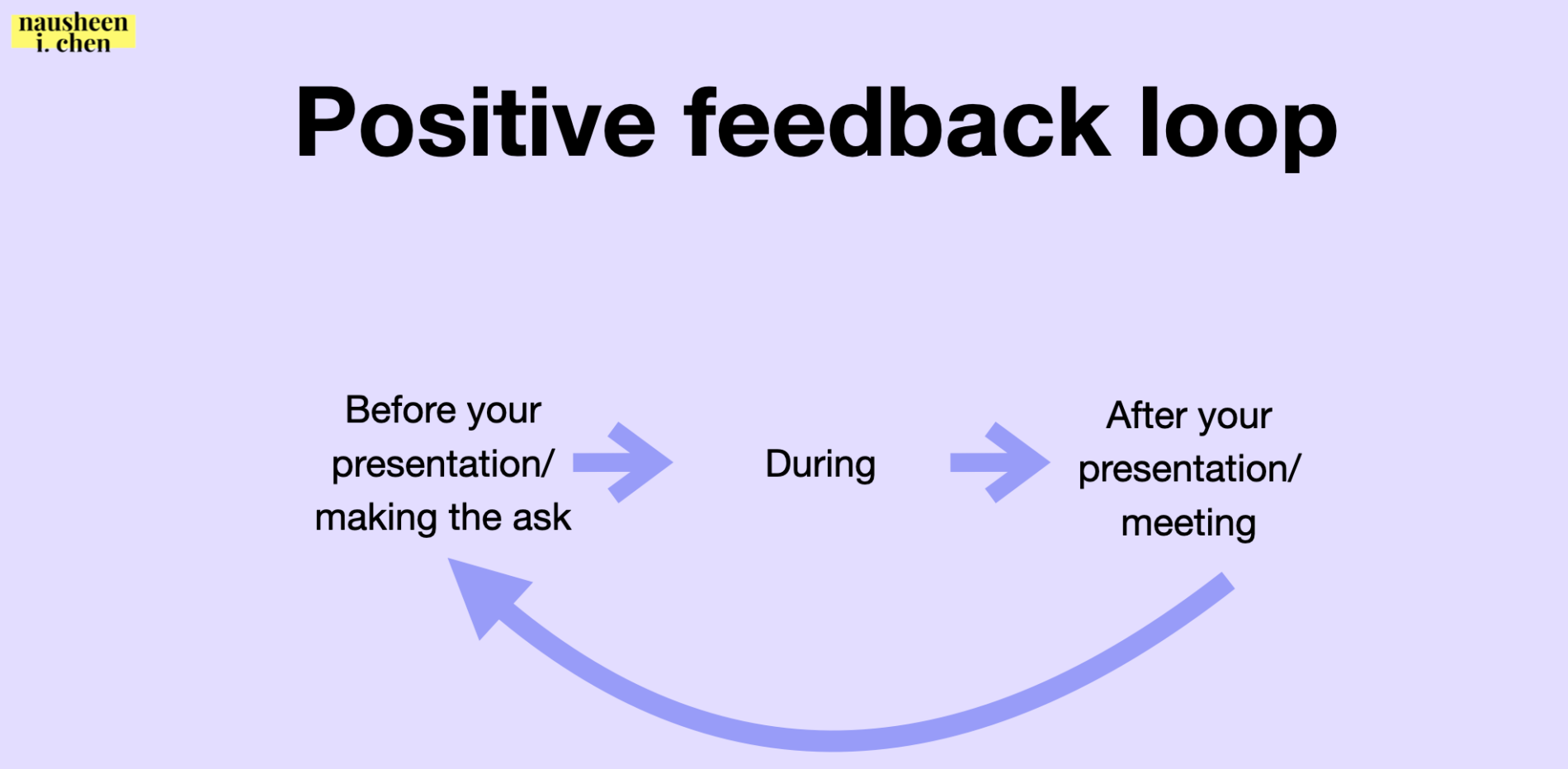If you’re a business leader, speaking in public is inevitable. But for some, it can be super painful. You don’t feel like yourself when you address an audience. You get nervous every time you have to step on stage or be on camera. Or maybe you do manage to get by when you speak to an audience, but don’t feel like you’re as impactful as you can be.
If that sounds like you, you’re absolutely not alone. Excelling in speaking in public is not just about perfecting your vocal tone, body language or slides; it’s about cultivating the right mindset. Once you’re armed with the right mindset that works for you – you’ll always know how to deliver your best performance on any stage, in any room or any Zoom.
In this guide, we’ll dive into mindset hacks that can help you overcome nerves and elevate your public speaking to new heights.
Table of Contents

Image by vectorjuice on Freepik
Understanding the Importance of Mindset
Your mindset can make or break your presentation. Through coaching business leaders over the past decade, I’ve seen all the tell-tale signs of a negative, unhelpful mindset:
- “I’m just gonna get it over with.”
- “I don’t need to rehearse, I’ll wing it.”
- “I don’t remember what I said, I just did it.”
And the most limiting one:
- “I’m an introvert, I can’t possibly be at ease speaking in public.”
These thoughts are indicative of a mindset that gets you stuck at average. You’ll either always be a victim of your nerves or you’ll get stuck at a B+ when you deliver your message. Either way – you’ll never be a memorable, impactful speaker.
And that’s how you could be in the dangerous territory of never getting your ideas across the finish line, never being able to energize your team, department or company and never winning that investor pitch.
Here’s the good news- I’ll share with you how to address and counter all these limiting beliefs and cultivate a mindset that supercharges your speaking skills and public persona.
Mindset Hack 1: Turn nerves into excitement
Even the most experienced speakers feel nervous before they step on stage. Your goal as a speaker is not to eliminate the nerves – it’s to make them work for you instead of against you.
An interesting fact to note here is that the body produces similar reactions to nerves and excitement: your heart beats faster, you might get sweaty, you might start obsessing about the thing you’re feeling nervous or excited about.
So it’s up to the brain to label that emotion. You are now in a position to convert that nervous energy into enthusiasm. If you tell yourself that you’re not “nervous”, you simply care about the outcome and want to deliver a compelling message.

An additional mindset hack here is to turn self-focus into audience-focus. Instead of telling yourself: “I have to deliver the best talk”, tell yourself – “I have to help someone in the audience who has this problem that I have a solution to”.
This shifts your mindset from feeling nervous about performing well to feeling excited that you’re able to help someone with your experience, idea or pitch.
This mindset shift has the power to turn the most intimidating speaking engagements into opportunities full of potential.
Mindset Hack 2: Turning self-consciousness into self-awareness

Photo by Brett Jordan on Unsplash
A number of my clients tell me they’re afraid of being judged or criticized when they speak. That fear of judgment makes them feel incredibly uncomfortable and self-conscious. Some clients even freeze on stage because they’re paralyzed by the fear of audience perception.
The mindset shift here – surprisingly – is not to turn that painful self-consciousness into an “I don’t care” attitude. Because if you don’t care about the audience, you may not care about giving your presentation or talk your 110%.
The shift here is to turn that self-consciousness into self-awareness. Instead of fixating on whether the audience is judging you, simply become aware of the situation. Use mindfulness to observe the audience and yourself when you’re in the spotlight.
Self-consciousness is about judging yourself based on how you perceive others to be judging you. Self-awareness is about being in tune with yourself and others – without judgment.
Being more self-aware lets you be more fully immersed in the moment, and more in control – so you’ll never feel like you “don’t remember what you said or did”. You’ll be fully aware and fully in control.
Mindset Hack 3: Separating idea from expression
Most business leaders have risen through the ranks in their companies because of gathering unique and exceptional knowledge. However, just because you’ve gained expertise in a field – it doesn’t mean you know how to articulate that knowledge well.
For a number of leaders, this is an uncomfortable mindset shift to acknowledge and embrace. They feel like they should be heard because they’re the experts. But when they get ignored, forgotten or negated despite the merit of their ideas – they get a reality check.

This mindset hack is to separate your expertise from your articulation. Treat your articulation and expression of the idea as a separate project to excel in. Embrace a growth mindset for improving your public speaking skills Attend workshops, take online courses, and learn from other successful speakers. The more you invest in your skill set, the more confident you’ll become.
This way you’ll make sure you don’t just have great ideas and experience to contribute – you also know how to express them in the most impactful and effective way.
Watch a video on how the way you say something is sometimes even more important than what you say.
Mindset Hack 4: Embrace Vulnerability
Use the Pratfall Effect to your advantage – when we see somebody we hold in high esteem share their failures or errors, it reinforces their honesty and transparency. Your audience wants you to be “authentic” – and sharing your vulnerability and human side will make you more of a “leader” when you speak, not less.

In your talk, aim to share stories of your failures, use self-deprecating humor to laugh at yourself, and show your true personality to enhance your likability and perceived charisma.
I’ll share a short story with you here: I was attending a high profile networking event of 500+ people, where a senior business leader was scheduled to speak. She stepped up to the stage. She took the mic. But then she froze. Her voice shook as she admitted: “I…I’m sorry I think I’m really nervous…”
She blurted out:
“This is my first time…talking on a stage…to so many people…”
The audience burst into applause. I looked around. I saw a sea of smiling, attentive and supportive faces. People that wanted her to succeed – not people who were judging her or laughing at her. This transformed the speaker – who was able to continue the talk and ended with a standing ovation. But more than that – it transformed and united the audience – who then admired and respected the business leader even more.
Mindset Hack 5: Visualize Success, Not Failure
Visualization is a powerful and underutilized tool. You can use it when you ideate, when you rehearse and in the moments leading up to your presentation.
Instead of imagining what could go wrong, visualize yourself succeeding. Imagine the exact environment that you’ll be presenting in – the venue, the chairs. Or, if it’s online, imagine the audience’s faces on video. Picture the audience engaged, nodding in agreement, and responding positively. Imagine people laughing at your joke, clapping at the end and forgetting about their phone notifications.

This visualization helps you in two ways:
First, it creates a positive, encouraging mindset where you foster positive self-talk instead of giving in to criticizing yourself:
“I will succeed – I’m imagining it right now” vs “I’m gonna fail and people will walk out”.
Second, it gives you a feeling of familiarity with the environment. Once you imagine that stage, the venue or even the tech setup for your online talk – you’ve already been there in your mind. When you do it for real, you won’t be walking into completely unfamiliar territory.
Mindset Hack 6: Turn “winging it” into preparedness
The biggest mistake that I’ve seen business leaders make before a presentation is – “I don’t have time to prepare, I’ll wing it”.
The most surprising thing is – these are the same business leaders who will often spend hours or days agonizing over the Powerpoint slides that they need to present. They will spend time finding or creating the right graphics and images. They will obsess over font sizes and colors.

The critical mistake here is that they think once their presentation slides are ready, they can go ahead and present it live without practicing. But what inevitably happens is that they end up reading the slides.
This makes for a poor speaking experience. Rehearsing the presentation is 50% of the experience. If you miss out on it, you’re only 50% prepared. The reason why most people don’t rehearse is because they either don’t know how to optimize their rehearsal to make it work for them, or they aren’t convinced that their rehearsal will help them perform better.
My recommendation here is to create a simple, clear process to rehearse which doesn’t take time and delivers results:
- Record yourself rehearsing – this is vital so that you have data to analyze when you evaluate your speaking skills and delivery
- Evaluate yourself on your performance in terms of your voice, energy and body language.
- Once you determine what you’re doing well on and what you can improve – choose one element of your delivery to improve in the next rehearsal.
This mindset shift from “I’ll wing it” to “I’ll prepare the best way I can” will transform your speaking skills. As an additional benefit, it will also help you get to know your content inside out so that you don’t need to read off of your slides – and you’ll know exactly how to lean into your strengths and address your opportunity areas.
Mindset Hack 7: How to improvise when you can’t prepare
There will be times when you simply can’t practice or rehearse your talk before you need to deliver it. That’s when you need to make sure you know how to improvise.
A lot of people mistake “improvising” for “winging it” – but they are very different. Winging it is about stringing words together to make sense without having an overall structure or plan. Improvisation is about expressing ideas on the fly, guided by tried-and-tested structures and frameworks.
You can’t prepare to “wing it” but you can absolutely prepare to improvise. Understand the rule of 3s, learn how to use storytelling and add emphasis to your message by highlighting it throughout your talk. Understanding key structures that guide your thoughts and help you articulate your ideas off the cuff is what sets you apart from a disorganized, spontaneous speaker.

Photo by Artur Voznenko on Unsplash
Mindset Hack 8: See Feedback as a Stepping Stone
A lot of leaders either avoid feedback on their speaking skills or think no feedback is good feedback.
“No one’s called me out for being an idiot, so I must be doing ok”.
The truth is – people won’t share what they really think of your communication skills till you ask. And unless you ask – you’ll neither know what you’re good at, nor what you can improve.
I have all my clients do an anonymous peer evaluation of their communication skills. I design a survey that asks how this person comes across when they speak in different environments and scenarios, and my client shares the survey with 30 of their colleagues, peers, management or board members, and even friends and family.

The results are always surprising and reassuring. A lot of my clients don’t know what people perceive them as – whether they come across as clear communicators, or whether they’re confusing when they speak. They don’t know if their confidence comes across as genuine or condescending. Getting this feedback has been crucial in informing the work that I do with my clients – so that we ensure they’re building on their strengths and addressing their opportunity areas.
Mindset Hack 9: Capitalizing Strengths
When I ask my clients how they did after a speaking opportunity, most start talking about what they did wrong. “My body language wasn’t that great”. “My intonations could have been better”. “I forgot what I had to say halfway through”.
I usually stop them halfway through their self-critique and ask them – “But what did you do well?” And I clarify that I’m not asking them this just to make them feel better.
The mindset hack here is to shift focus from being hyper-critical to becoming aware of your strengths and building on them. This graph illustrates why – building on our strengths gives us the shortest distance to travel between average and exceptional. We are more likely to get to that exceptional level if we become better at what we’re already good at.
This is of course, not to say that we should have blind spots or lose sight of improving at the things we’re not good at. But focusing only on what we did wrong not only contributes to negative self-talk but also undermines efforts to build on our strengths.

Mindset Hack 10: Celebrate Each Win
This is what most business leaders miss out on: creating a positive feedback loop.
After you’re done with a big presentation or pitch – instead of just moving on, use the experience to document and acknowledge your progress. This helps you in two ways:
First it gives you data to work on in the future – a better awareness of what you’re doing well and what you can improve on.
And secondly, it helps you talk back to the negative voices in your head. The next time you have a big speaking opportunity coming up and you feel nervous or lack confidence, you can use past successes as “proof” that you’ve done well speaking in public in the past and you can smash the next opportunity just like you did in the past.

A watch out here is to not give too much weight to “negative” public speaking experiences. Be intentional about how you process them – take them as data, use it as evidence to seek coaching or document exactly how you can deal with the situation differently next time.
As a business leader, it’s crucial that you’re able to effectively express your ideas, inspire your team and propel them into action and build credibility each time you speak in public. By cultivating a positive and growth-oriented mindset, you can not only navigate the challenges of public speaking but also thrive in the spotlight.
Embrace the nerves, focus on creating self-awareness to gain back control, and continually refine your approach. Remember, the most influential speakers are not those without fear, but those who have learned to master it.
Want to learn how to master public speaking as an entrepreneur or a business leader? Let’s talk.



